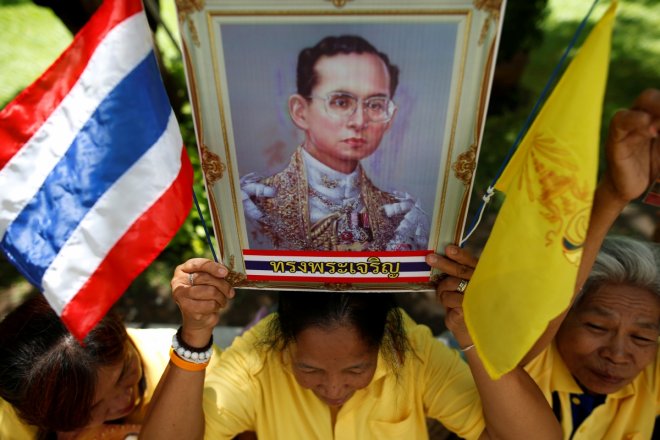
Thailand's vexing succession issue has once again come to the fore with the palace saying King Bhumibol Adulyadej's health has become unstable.
The Thai monarchy is facing an unprecedented crisis with the 88-year-old king's health declining. Bhumibol commands unreserved reverence across the country and has remained unifying force in a country racked by bitter political divisions.
Now, what beyond Bhumibol?
The ruling military junta spent hundreds of millions of dollars in recent years on activities promoting the country's revered monarchy and the King, who has been on the throne for seventy years. The junta campaign was titled "Worship, protect and uphold the monarchy."
Analysts predict highly destabilising consequences if heir apparent Vajiralongkorn were to assume throne at a time when deep routed political differences stayed unresolved.
Vajiralongkorn, is not as popular as the king and his playboy lifestyle has further distanced him from ordinary Thais. Popular support is welling for his sister, Princess Sirindhorn, to assume the throne but Thai monarchy doesn't approve of women becoming the sovereign.
Complicating the matter further, Thailand's notorious les majeste laws prevent any serious discussion over the future of the monarchy.
The Republican movement is gaining strength especially with the help of the spread of Internet and the outspoken campaigns run by expatriate Thais. The call for the setting up of a republic became louder following the ouster of prime minister Thaksin Shinawatra in 2006. The great divide in Thai politics -- between the rural supporters of Thaksin and the capital's civilian elite backed by the military has become more exasperated.
Thaksin's sister Yingluck too was ousted as prime minister in 2014 by the junta. On both occasions the King's blessings were with the junta.
Absolute monarchy was abolished in Thailand in 1932, but with the ascension of Bhumibol to the throne in 1946, many of the ancient practices came back to life.
The king became a demi-god and public worship of the sovereign became the norm. The ancient practice of crawling and kneeling in front of the king returned.
While the king has sided with the military in recent years, Thais don't forget that Bhumibol had intervened in 1973 and 1992 when the military unleashed violence against anti-dictatorship protesters.
Detractors of Thai monarchy and the rule by junta say the world's longest ruling monarch is an absolute sovereign despite the 1932 proclamation. Thailand has witnessed more than 20 coups in the last hundred years and many of these happened during the 70-year reign of Bhumibol. He has always remained at the helm and has been the obvious bedrock of support behind the military which enacted the coups.
This makes any question about succession gets linked to the question of the reform of Thai monarchy. While the super elite of the capital and the military establishment are happy with every coup and overloading of the king's plate with more and more powers with each coup, the ordinary Thais are facing up to nightmarish restrictions on their freedoms, desecration of democracy and more importantly an alarming failure of the national economy.









